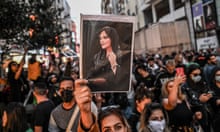Iran drew international condemnation on Saturday after it executed two men for killing a paramilitary force member in November during protests sparked by the death in custody of a young woman.
The latest killings double the number executed so far in connection with the nationwide protests. Two men were put to death in December, sparking global outrage.
They also come in defiance of a campaign by international rights groups for the lives of the two men to be spared.
“Mohammad Mahdi Karami and Seyyed Mohammad Hosseini, the main perpetrators of the crime that led to the martyrdom of Ruhollah Ajamian, were hanged this morning,” judicial news agency Mizan Online reported on Saturday.
The UN human rights office decried the executions, which it said followed “unfair trials based on forced confessions”.
“We urge Iran to halt all executions,” it said on Twitter.
The British foreign minister, James Cleverly, condemned the executions and urged Iran to “immediately end the violence against its own people”.
“The execution of Mohammad Mahdi Karami and Seyed Mohammad Hosseini by the Iranian regime is abhorrent,” Cleverly said on Twitter. “The UK is strongly opposed to the death penalty in all circumstances.”
The US state department condemned “in the strongest terms” what it said were the “sham trials and execution” of the men.
“These executions are a key component of the regime’s effort to suppress protests,” state department spokesman Ned Price said on Twitter. “We continue to work with partners to pursue accountability for Iran’s brutal crackdown.”
Iran hanged the two men for allegedly killing a member of the security forces during nationwide protests that started after the death of 22-year-old Kurdish Iranian woman Mahsa Amini last September.
The European Union said it was “appalled” by the executions.
“This is yet another sign of the Iranian authorities’ violent repression of civilian demonstrations,” the spokesperson for the bloc’s foreign affairs chief, Josep Borrell, said, urging an immediate end to death sentences against protesters.
Iran’s court of first instance had sentenced the two men to death in early December, it said, and on Tuesday the supreme court upheld the death sentences, accusing them of killing Ajamian on 3 November.
The victim was a member of the Basij militia – linked to the Islamic Revolutionary Guards Corps – who died in Karaj, west of Tehran.
Prosecutors previously said the 27-year-old was stripped naked and killed by a group of mourners who had been paying tribute to a slain protester, Hadis Najafi.
Karami’s parents issued a video pleading for authorities to spare his life in December.
“I respectfully ask the judiciary, I beg you please, I ask you … to remove the death penalty from my son’s case,” said Mashallah Karami.
He described his son as a former national karate team member and told Iranian media that a family lawyer had been unable to access his case file.
Karami was not allowed to have a final meeting with his family and had foregone food and water in protest, according to Mohamad Aghasi, whom relatives wanted to handle the case, in remarks on Twitter.
Mahmood Amiry-Moghaddam, the director of Oslo-based group Iran Human Rights, said both men “were subjected to torture, sentenced after sham trials … without the minimum standards for due process”.
Nazanin Boniadi, a British actor of Iranian origin and an ambassador for Amnesty International in the UK, said on Twitter that the “political cost of Iran executions” must increase.
Campaigners have called for stronger international action after the latest executions.
The New York-based Center for Human Rights in Iran said foreign nations must withdraw their ambassadors from Iran and call for a moratorium on executions and state violence against peaceful dissent.
“We are mourning as a nation,” prominent US-based dissident Masih Alinejad said in a Twitter post. “Help us save others.”
Authorities have arrested thousands people in the wave of demonstrations that began with the death in custody of Amini, who had been arrested by morality police for allegedly breaching the strict dress code for women.
Since the beginning of the protest movement, courts have sentenced 14 people to death in connection with the demonstrations, according to an Agence France-Presse count based on official information.
Among those, four have been executed, two others have had their sentences confirmed by the supreme court, six are awaiting new trials and two others can appeal.














